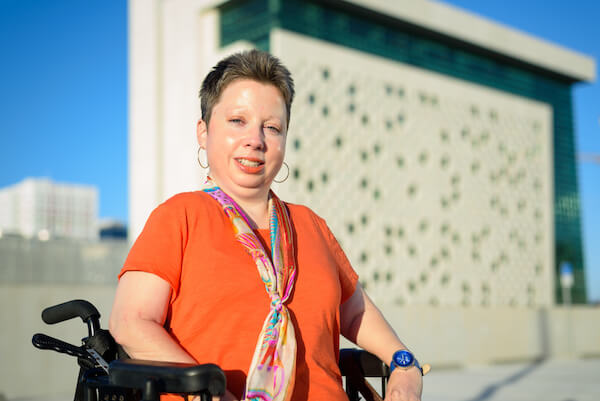By David-Elijah Nahmod

Heidi Johnson-Wright, author of the leading story in the collection Firsts: Coming Of Age Stories By People With Disabilities, has lived with the complicated effects of rheumatoid arthritis since around the age of 9. The condition made it necessary for her to use a wheelchair and curtailed her ability to perform simple, everyday tasks. When she began college in the 1980s, she needed a caregiver to help her dress and get to class on time. Johnson-Wright quietly accepted her situation, excelling in her studies. She even had a boyfriend.
In “Life with Lexie,” her Firsts contribution, Johnson-Wright recalls her friendship with Lexie, her college caregiver. She also recalls the abuse she withstood at the hands of her own mother, who was unable to deal with the harsh realities of Johnson-Wright’s disability. Johnson-Wright now speaks to us about how this abuse affected her rheumatoid arthritis.
“As is true of many other medical conditions, stress can exacerbate rheumatoid arthritis, making one prone to flairs,” she said. “The more the disease acts up, the faster permanent joint damage occurs. And if you have a condition with chronic pain, anxiety makes the physical sensations of the pain worse. I didn’t learn that until I was in my 30s. No one bothered to tell me that when I was a kid.”
Johnson-Wright noted that when she was a child — in the worst throes of her disease — kids were not treated as full-fledged humans. “The pain of kids was not taken as seriously as that of adult patients,” she said. “It seems incredible now when I think about it, but all the years that I received treatment at what was considered a cutting edge pediatric rheumatology clinic, no one ever asked me how I was managing the pain.”
And because of the nature of their relationship, Johnson-Wright was never able to discuss these issues with her mother. “I don’t remember ever truly having a constructive conversation with my mother,” she recalls. “Not in the sense of two people communicating, truly listening to each other, and respecting each other’s feelings and opinions. Part of that was due to her having what I believe to be borderline personality disorder, and never being able to get beyond being a narcissistic bully. But part of it was due to the generation my parents came from. Children were devalued and were expected to be seen but not heard.”
Johnson-Wright has also faced obstacles in her adult life, such as disability discrimination. “Every time a building, a transit station, or a streetscape is designed with an end user in mind that is the mythical 5-foot, 9-inches, 175-pound, white, non-disabled male, disability discrimination is there,” she pointed out.
She added that she recently saw a statistic which said that less than one percent of housing units in the United States are move-in ready for wheelchair users.
“The other 99 percent require renovations before someone like me could live there,” she said. “Imagine going apartment hunting and knowing that 99 percent of what’s out there will automatically be off limits to you, simply because you have a disability.”
Ride service providers such as Uber and Lyft also do not accommodate people with disabilities, according to Johnson-Wright. “Yet we don’t hear the outrage and disgust,” she said. “That is disability discrimination.”
Johnson-Wright’s disability did not play a role in her becoming an attorney. It’s what her father wanted her to do, and it’s what he was willing to pay for.
“I would love to have been an Egyptologist, or perhaps an art historian,” she said. “I also think it would be amazing to work with animals, perhaps for an animal conservation organization. But on a more practical level, I could see myself as a college literature professor.”
She explains why she chose to share the story of Lexie, her college caregiver.
“It was a profound relationship that took place at a critical juncture in my life,” she said. “We all enjoy reminiscing about our college days, and I simply can’t separate that experience from the relationship I had with Lexie. I also wanted to write about a rite of passage that was perhaps a little less obvious than something like first love or losing one’s virginity.”
And what advice does Johnson-Wright offer to other disabled people?
“Don’t hide, don’t try to pass for non-disabled,” she says. “If someone makes you feel inferior for having a disability, get the hell away from them. Hang out with kind, good hearted, nurturing people. Stay away from manipulators and abusers. Find out what you’re good at, discover your passion, and follow it. Find your disability identity and be proud.”
The anthology Firsts: Coming of Age Stories by People with Disabilities is available now on Amazon, and other retailers.
